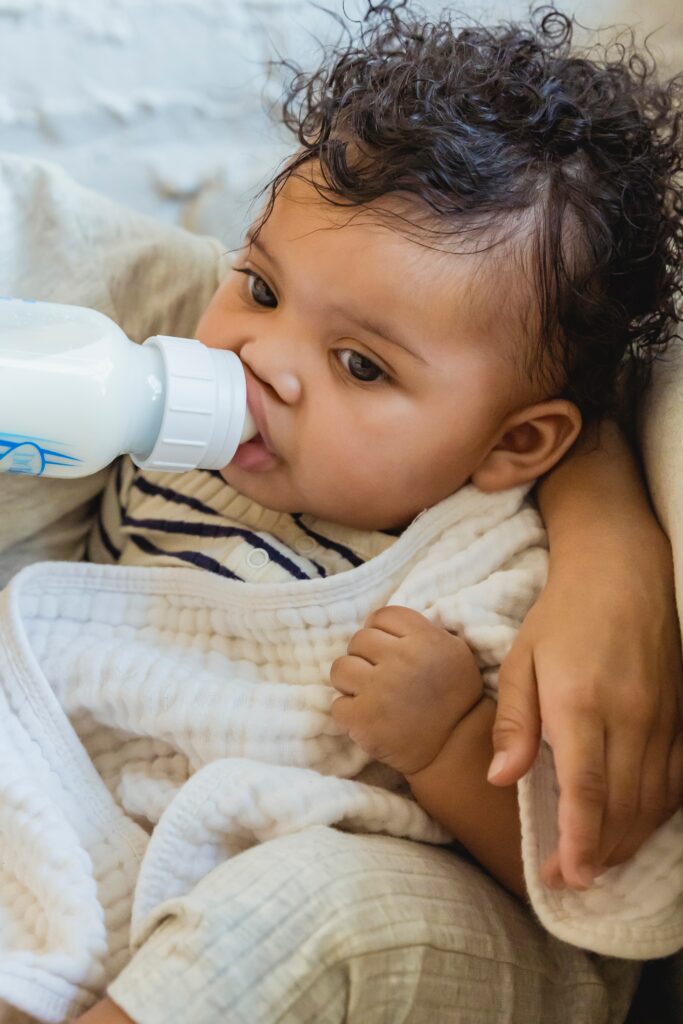
Baby formula (liquid food that some infants eat) is being shipped from Europe to the United States—enough to fill more than half a million bottles.
That’s because there is a shortage (not enough) of some kinds of baby formula in some of the United States and, to a lesser extent, in Canada. Millions of families have had trouble finding formula to feed their infants. When they go to the grocery store to buy it, there often isn’t any on the shelves—or at least, none of the kind their baby needs.
About half the stores in six US states say they are out of the product, according to the Toronto Star.
Why isn’t there enough baby formula in the US and Canada right now?
There are a few reasons, say experts, but one major thing happened in February: one of the main makers of the product had to recall (take back) formula it had made. They were worried that when it was made some bacteria may have accidentally gotten into it. Bacteria that could make babies sick. Abbott Nutrition, in Michigan, US, said there was a risk that some of their products, like Similac, contained bacteria such as salmonella. They didn’t want any babies eating the food and getting sick, so they took it off the grocery store shelves.
Meanwhile, many parents who heard about the recall bought as much of the safe formula as they could, afraid they might not be able to buy it later. That kind of bulk buying cleared the shelves in many grocery stores.
The war in Ukraine has also been a factor because that country makes sunflower oil, which is an ingredient in some types of baby formula.
It will take Abbott a while to fully clean their factory to get rid of any possible bacteria. They say they should be ready to make new formula in about a month and they expect grocery stores to be fully stocked again by August, according to reports.
Abbott is one of four companies that makes most of the baby formula produced in the United States, another thing that may be adding to the problem. If there were more companies that make formula, experts say, the problem might not be as bad, since there would be other companies to buy from.
In Canada, the information on food labels must be in both of its official languages: English and French. To help get formula into the country quickly, the Canadian government has temporarily stopped requiring formula labels to be in French. That’s so English speaking countries like the UK and Ireland can send formula to Canada right away, without have to redo the labels first.
One of the types of formula that is in most demand and hardest to find right now is “hypoallergenic” formula. That is food made for babies who are allergic to cow’s milk.
Thank you to Pam Jen and Valerie Strain for their invaluable assistance with this article.
THINK AND DISCUSS
- Many babies are fed breastmilk but, for a variety of reasons, there are many babies that do not have access to breastmilk. Discuss.
- Four companies make about 90% of the baby formula made in the United States: Abbott, Reckitt, Nestle and Perrigo, CTV News reports. Why is this an issue? How might this have contributed to the current lack of available baby formula?
3. Another phrase for the kind of bulk purchasing that happened when parents were afraid they wouldn’t be able to find formula is “panic buying.”
a. Can you think of any other times when there was panic buying? (Think about the start of the COVID-19 pandemic, for instance.)
b. Do you think panic buying helps or harms a country?
c. What do you think we can learn from panic buying?
d. If you were faced with a shortage of something very important to you, would you buy as much as you could? Why or why not?
4. For people who speak French and not English, they may have to buy baby formula that doesn’t have instructions in French. In your opinion: Should the Canadian government delay the arrival of the formula until the labels are translated for the safety of all Canadian babies? Or: How could the Canadian government help French-speaking families who receive formula with labels written in English-only?
LINKS TO MORE INFORMATION
Low-income families may be disproportionately affected by the infant formula shortage. As well, Black families may be more affected by the shortage. This Guardian article explains: https://www.theguardian.com/us-news/2022/may/18/baby-formula-shortage-why-is-there-none-what-to-do-causes-explained
Reuters article about the February Abbott formula recall: https://www.reuters.com/business/healthcare-pharmaceuticals/abbott-recalls-certain-similac-baby-formula-made-michigan-facility-2022-02-17/
Abbott’s recall notice (Canadian), which specifies which brands and lot numbers were recalled.
CTV article on the shortage: https://www.ctvnews.ca/health/baby-formula-health-canada-monitoring-potential-sunflower-oil-shortage-1.5916335
For those who want to delve deeper into the reasons behind the shortage, this CTV News article does a good job of explaining the US’ WIC program, which provides subsidies for formula to low-income families: https://www.ctvnews.ca/business/u-s-safety-savings-rules-set-stage-for-baby-formula-shortage-1.5916130







